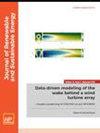基于变分模式分解和生物启发LSTM的混合小时前风电预测模型
IF 1.9
4区 工程技术
Q4 ENERGY & FUELS
引用次数: 1
摘要
风电作为一种环保的可再生能源,已被广泛纳入现代电力系统。风电预测的准确性对电力系统的安全运行至关重要。为了提高预测精度,本文提出了一种混合小时前风电功率预测方法。首先,使用变分模式分解(VMD)将原始风电序列分解为一组不同频率的固有模式函数(IMF)。然后,通过使用每个IMF的长短期记忆(LSTM)网络来制定预测模型。为了增强LSTM,混合了一种名为Harris-Hawk优化(HHO)的生物启发算法来优化每个LSTM预测模型的参数。因此,通过对这些单独的IMF的所有预测结果进行积分,可以获得最终的预测输出功率,从而开发出新的VMD-HHO-LSTM预测策略。最后,基于真实历史数据集进行了案例研究,表明所提出的VMD-HHO-LSTM混合小时前风电预测模型具有更好的预测性能,对多个数据集场景具有更高的适用性。本文章由计算机程序翻译,如有差异,请以英文原文为准。
A Hybrid Hour-ahead Wind Power Prediction Model Based on Variational Mode Decomposition and Bio-Inspired LSTM
Wind power, as an eco-friendly renewable energy, has been widely integrated into modern power systems. The prediction accuracy of wind power is crucial to the secure operation of power systems. To improve the prediction accuracy, a hybrid hour-ahead wind power prediction method is presented in this paper. Firstly, the variational mode decomposition (VMD) is used to decompose the original wind power sequences into a set of intrinsic mode functions (IMFs) with different frequencies. Then, the prediction model is formulated by using the long short term memory (LSTM) network for each IMF. To enhance the LSTM, a bio-inspired algorithm named Harris Hawk optimization (HHO) is blended to optimize the parameters of each LSTM prediction model. The final prediction output power is thus obtained by integrating all prediction results from these individual IMFs, so that the novel VMD-HHO-LSTM prediction strategy is developed. Finally, case studies based on the real historical dataset are performed, demonstrating that the proposed hybrid hour-ahead wind power prediction model named VMD-HHO-LSTM has better prediction performance and higher applicability to multiple dataset scenarios.
求助全文
通过发布文献求助,成功后即可免费获取论文全文。
去求助
来源期刊

Journal of Renewable and Sustainable Energy
ENERGY & FUELS-ENERGY & FUELS
CiteScore
4.30
自引率
12.00%
发文量
122
审稿时长
4.2 months
期刊介绍:
The Journal of Renewable and Sustainable Energy (JRSE) is an interdisciplinary, peer-reviewed journal covering all areas of renewable and sustainable energy relevant to the physical science and engineering communities. The interdisciplinary approach of the publication ensures that the editors draw from researchers worldwide in a diverse range of fields.
Topics covered include:
Renewable energy economics and policy
Renewable energy resource assessment
Solar energy: photovoltaics, solar thermal energy, solar energy for fuels
Wind energy: wind farms, rotors and blades, on- and offshore wind conditions, aerodynamics, fluid dynamics
Bioenergy: biofuels, biomass conversion, artificial photosynthesis
Distributed energy generation: rooftop PV, distributed fuel cells, distributed wind, micro-hydrogen power generation
Power distribution & systems modeling: power electronics and controls, smart grid
Energy efficient buildings: smart windows, PV, wind, power management
Energy conversion: flexoelectric, piezoelectric, thermoelectric, other technologies
Energy storage: batteries, supercapacitors, hydrogen storage, other fuels
Fuel cells: proton exchange membrane cells, solid oxide cells, hybrid fuel cells, other
Marine and hydroelectric energy: dams, tides, waves, other
Transportation: alternative vehicle technologies, plug-in technologies, other
Geothermal energy
 求助内容:
求助内容: 应助结果提醒方式:
应助结果提醒方式:


